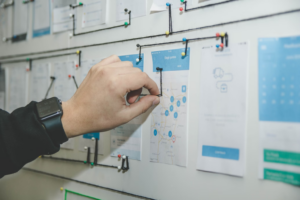Have you ever considered taking a career break? This type of action can come in many forms:
- Taking one of those well-known “sabbatical years” (or sabbatical terms, which are also valid).
- Replacing one job with another.
- Simply staying in your current job but slowing down the pace.
What is a career break?
This expression usually refers to the breaks we take during our working day. However, we can also use it when we decide to take a long break from our usual work to redefine our careers.
Are career breaks related to the Great Resignation?
In a sense, yes, given that many people who have resigned from their positions in recent years wish to start working differently instead of maintaining the working conditions they had.
What is the purpose of a career break?
Each person takes breaks in their professional career for different reasons, which have to do with their needs at that moment and their way of enhancing their well-being. Sometimes it is necessary to stop to analyze, experience other options, and make decisions that allow us to continue developing professionally.
Can companies avoid career breaks?
Sometimes, if the employee’s decision is firm, there is not much to do. However, companies can prevent many career breaks among their employees by improving their working conditions and fostering a good experience within the company.
Moreover, it is important to analyze not only the specific way in which an employee takes or intends to take a career break, i.e., a change in some relevant aspect of the way they work, usually related to the task being performed or the intensity with which it is carried out. It is also interesting to analyze what reasons may lead them to want or need to take that particular work break: why do it, why now, and with what expectation.

Taking a career break in the current context
Nowadays, it isn’t very easy to talk about the increasing tendency of many employees to take a career break or desire to do so without referring to certain recent work dynamics. Without going any further, the discussion about the existence and consequences of the Great Resignation has kept many managers amused over the last few years, and who knows if it will not also be one of the trends in Human Resources in 2023.
The topic is no small matter: thousands of workers leaving their jobs in a matter of months to opt for a new way of life (and work), just at a time of great global uncertainty. And in many cases without, apparently, their working conditions being terrible. But were they really not?
An overall satisfactory job
As we indicated earlier, behind every participant in the Great Resignation, there is a different story made up of different needs, motives, and perspectives. However, there may be one aspect that is quite common to all these stories: no one leaves a job that can fulfill their overall well-being at work. Overall does not mean just well-paid work, just entertaining, just comfortable, or just interesting. Overall means that the job brings several significant benefits to the employee – not just one benefit – and does so in a balanced way.
Moreover, for a job to be satisfactory on the whole, it is not enough for the employee to like it. The employee must perceive themselves as capable of doing it. We have said that no one leaves a fulfilling job, just as no one experiences motivation for a long time to do a job that they feel incapable of doing or where their usual state is anxiety at work.
And then comes the moment to take what we call a “career break”.
From the Great Resignation to the Great Break (career-wise)
We have recently witnessed a relevant example in this regard: Jacinda Ardern, Prime Minister of New Zealand (and, by the way, one of the most prestigious politicians in the world), decided to resign from her position, that is, she decided to take a break from her job. The reason? According to her, she does not feel she has enough “energy” to do such a demanding job and has clearly seen that the time has come for her to step aside.
The Great Resignation has made us take a very close look at all those work situations that were so unsatisfactory that they led its protagonists to jump off the boat unexpectedly. However, what would happen if we also looked at all those resignations where the reason is not so much dissatisfaction but simply the perception that the employee feels they can no longer perform a job and need to stop? Those situations in which if employees insist on continuing, both they and their work will be damaged in one way or another.
Jacinda Ardern has taken a career break, just as many people involved in the Great Resignation have taken a career break, and many other employees have not yet done so but would like to do so. Or, at least, they are considering whether the time has come to a stop in their professional careers to step aside and say: from now on, it’s no longer this way, which means I have to take a break.
Join the global leading solution in mental well-being
Stopping is not the end
Knowing when it is time to take a break from work – regardless of whether circumstances allow us to take this step – is crucial in our role as workers. It is important to understand that if we do so, we are not necessarily putting an end to our career, but rather we are setting a turning point or, in more intense cases, a full stop. Moreover, this point comes from a certain trajectory and will facilitate the next thing to come in our professional path.
For this reason, the time has come for HR managers in companies to read the Big Resignation as a massive Big Break movement or simply as many employees have found to take a career break to protect their psychological well-being. A time when employees decide to step aside to thrive as people and not just as workers.
Aspects to consider in a career break
1. Professional development
This element of our role as employees is the first one that can be put in crisis when we decide to take a career break. The reason is the temptation to interpret this type of action as unproductive interruptions in our work that lead us to become stagnant or obsolete, so taking a break from work is very scary from this point of view. However, it is important to interpret this type of break precisely as a necessary option to revitalize professional development that may be strangled by our current situation.
2. Motivation at work
This point is at the root of all career breaks since people who take them do not feel the kind of motivation towards their work that they would need to be able to continue in it with all their energy and involvement. On the contrary, their work motivation is focused on another type of job or the same one but with some modifications.
3. Coping psychologically with unemployment
Whether we like it or not, many career breaks are temporarily linked to a period of unemployment that can be challenging at different levels. Taking this into account, making the necessary preparations and managing to make this period of unemployment as fruitful as possible is essential so that the decision to take a break from work does not lose meaning.

Protecting emotional well-being in organizations
At ifeel, by interpreting in depth the complexity of labor and sociological phenomena such as the Great Resignation, companies open themselves to learning what they can do to minimize avoidable resignations. And how an organization can help a particular employee to take the break from work that they need to take now without it being detrimental to either of them.
That’s why we provide a global emotional well-being service for companies designed by our team of psychologists who are experts in well-being at work. This collaboration allows People, Talent, and Human Resources managers to receive personalized, data-driven advice on caring for the psychological well-being of the teams in charge.
Do you belong to the Human Resources department in your organization? Try our program now to see how it could help you.
In addition, our program offers all employees a complete mental health care service that includes emotional support and online therapy with one of our professionals.
Remember, you can find different materials in our Resources section, such as Podcasts, HR Guides on various topics (e.g., employee experience or how to design a good HR strategy), or Interviews with important HR positions. In addition, we have a Psychosocial Risk Factors Template, which you can use to comply with the requirements of the Labor Inspectorate.
We hope you found this post about taking a career break interesting. If you would like more information about our emotional well-being program for companies, simply request it, and we will contact your team as soon as possible.
How can taking a career break improve mental well-being?
Taking a career break can provide a much-needed opportunity to rest, recharge, and prioritize self-care. It can alleviate stress, burnout, and mental health issues, allowing individuals to focus on their well-being and personal growth.
Will taking a career break be seen as a weakness or gap in someone’s employment history?
While there may be some stigma surrounding career breaks, it’s important to prioritize your mental health. When explaining the break, highlight the steps taken to improve your well-being, such as therapy, self-reflection, or skills development, to demonstrate your commitment to personal growth.
How can people prepare financially for a career break focused on mental well-being?
Financial planning is crucial before taking a career break. Create a budget, save money, and explore financial support options like personal savings, severance packages, or part-time work to maintain stability during the break.
Can a career break help employees overcome mental health challenges?
Yes, a career break can provide an opportunity to address and overcome mental health challenges. Use the break to seek professional help, engage in therapy or counseling, develop coping mechanisms, and establish healthy habits that contribute to improved mental well-being.
How can employees transition back to work after a career break without compromising their mental health?
Returning to work after a career break requires careful consideration. Set realistic expectations, ease back into work gradually, and establish healthy work-life boundaries. Communicate openly with your employer about your needs and prioritize self-care to maintain your mental well-being during the transition.









